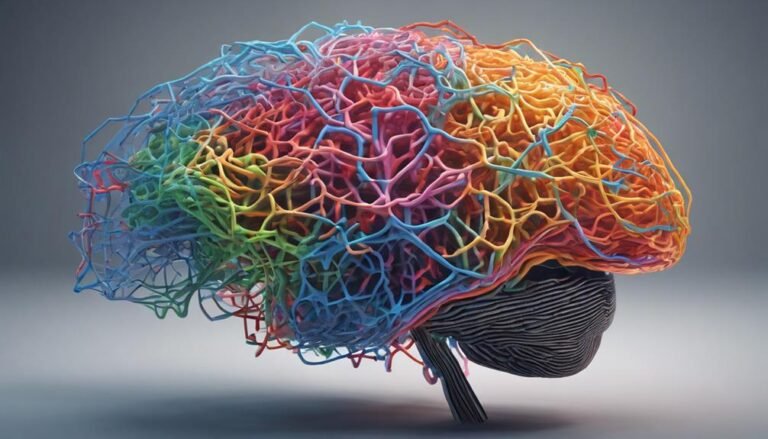Jung’s Typology and Personality Types
Did you know that according to a recent study, over 80% of Fortune 500 companies use personality assessments like Jung's Typology to enhance team dynamics and communication? Understanding your own personality type can be a powerful tool in managing various aspects of your life. By recognizing your preferences and tendencies, you can gain valuable insights into why you react a certain way in different situations. This awareness opens up a world of possibilities for personal growth and enhanced relationships, both professionally and personally.
Key Takeaways
- Jung categorized individuals based on perception and judgment preferences.
- Understanding introversion and extroversion enhances interpersonal relationships.
- The four functions (thinking, feeling, sensation, intuition) shape behavioral patterns.
- Cognitive functions influence decision-making processes and behavior.
- Practical applications include enhancing collaboration, communication, and relationship understanding.
Carl Jung's Psychological Types
In Carl Jung's theory of psychological types, individuals are categorized based on their preferences in perception and judgment. Jung's influence on personality assessment has been profound, shaping how individuals comprehend and categorize personality traits.
Through his work, Jung introduced the concepts of introversion and extroversion, sensing and intuition, thinking and feeling, and judging and perceiving. These preferences form the basis of Jung's typology, allowing individuals to identify their dominant traits and comprehend how they interact with the world around them.
Personality assessment based on Jung's typology provides a framework for individuals to gain insights into their behavior, decision-making processes, and interpersonal relationships. By recognizing their preferences in perception and judgment, individuals can better navigate their personal and professional lives.
Jung's typology offers a valuable tool for self-reflection and personal growth, enabling individuals to leverage their strengths and address areas for development. Through understanding Jung's psychological types, individuals can begin a journey of self-discovery and enhanced self-awareness.
Understanding Introversion and Extroversion
Understanding the differences between introversion and extroversion is essential in comprehending how individuals engage with the world and interact with others. Introverts tend to draw energy from within, preferring solitary activities and introspection to recharge. Their communication styles often lean towards thoughtful and reflective, allowing for deep conversations but sometimes struggling with small talk. In social dynamics, introverts may excel in one-on-one interactions, showing empathy and listening skills.
On the other hand, extroverts thrive in social settings, gaining energy from external stimuli and interactions with others. Their communication styles are usually more outgoing and expressive, making them adept at networking and engaging in group discussions. In the work environment, extroverts may excel in roles that require collaboration and teamwork, bringing energy and enthusiasm to team projects.
Understanding introversion and extroversion can lead to better team collaboration by appreciating the diverse communication styles and energy sources that individuals bring to the table.
The Four Functions of Personality
Exploring the four functions of personality reveals the intricate ways individuals perceive and interact with the world around them. Personality development is deeply intertwined with these functions, which encompass thinking, feeling, sensation, and intuition. Each of these functions plays a vital role in shaping behavioral patterns and responses to various situations.
Thinking, as one of the functions, influences how you analyze information logically and make decisions based on reason and objective facts. Feeling, on the other hand, guides your emotional responses and evaluations of situations, emphasizing empathy and personal values.
Sensation relates to how you perceive the physical world through your senses, focusing on concrete details and experiences. Finally, intuition involves processing information abstractly, looking beyond the surface to see patterns, connections, and possibilities.
Understanding how these functions work together in your personality can provide valuable insights into your preferences, strengths, and areas for growth. By recognizing the impact of each function on your behavior, you can navigate challenges more effectively and cultivate a deeper understanding of yourself and others.
Thinking, Feeling, Sensation, Intuition
As you explore Thinking, Feeling, Sensation, and Intuition within Jung's Typology, you'll investigate the core cognitive functions that shape your personality.
Understanding how these functions manifest in your behavior can provide valuable insights into your unique traits and tendencies.
Cognitive Function Overview
One's cognitive functions, encompassing thinking, feeling, sensation, and intuition, play an essential role in shaping their personality and decision-making processes.
Cognitive function analysis is a key aspect of understanding how individuals perceive and interact with the world around them.
Thinking types tend to prioritize logic and reason in their decision-making, while feeling types focus on emotions and values.
Sensation types are attuned to the present moment and concrete details, whereas intuition types are more inclined towards abstract ideas and future possibilities.
Personality Trait Analysis
In exploring personality traits related to thinking, feeling, sensation, and intuition, one examines the core of individual cognitive processes and decision-making tendencies. Behavioral patterns play a significant role in understanding how individuals process information and make choices.
Thinking individuals tend to rely on logic and objective analysis in their decision-making, while feeling types prioritize values and emotional considerations. Sensation-oriented individuals focus on tangible details and experiences, whereas those inclined towards intuition are more interested in patterns, possibilities, and future implications. These preferences shape individual differences in character analysis and influence how individuals interact with the world around them.
Personality development is intricately linked to these cognitive functions, with each person developing a unique blend of thinking, feeling, sensation, and intuition over time. By recognizing and acknowledging these traits, individuals can gain a deeper understanding of themselves and others, fostering better communication and relationships.
Delving into the nuances of these personality traits allows for a more thorough exploration of human behavior and decision-making processes.
Practical Application Insights
Exploring practical applications of Jung's typology and personality types reveals valuable insights into how individuals approach decision-making based on their thinking, feeling, sensation, and intuition preferences.
In workplace dynamics and team building, understanding the Thinking (T) and Feeling (F) preferences can enhance collaboration. Thinkers focus on logic and objectivity, while Feelers prioritize empathy and harmony. By recognizing these differences, teams can leverage diverse perspectives for more effective problem-solving and decision-making processes.
Sensation (S) and Intuition (N) preferences come into play when considering relationship compatibility and communication strategies. Sensors tend to focus on concrete details and practicality, while Intuitives gravitate towards future possibilities and abstract thinking. Recognizing and respecting these preferences can lead to improved communication and mutual understanding in relationships.
The Theory of Psychological Types
Let's begin by examining Jung's core concepts in the theory of psychological types. Understanding these concepts will help you grasp the fundamental framework upon which personality types are built.
Jung's Core Concepts
Understanding Jung's core concepts, particularly his Theory of Psychological Types, provides valuable insight into the complexities of human personality and behavior. Jung's exploration of archetypes and symbolism examines the universal patterns and images that shape our collective unconscious. These archetypes, such as the hero, the mother, or the trickster, carry deep symbolic meanings that influence our thoughts and behaviors.
Jung also introduced the concepts of the shadow and the self. The shadow represents the dark and unconscious aspects of our personality that we often repress or deny. By confronting and integrating our shadow, we can achieve a more holistic sense of self-awareness.
On the other hand, the self symbolizes the center of our psyche, aiming for unity and wholeness.
Types and Traits
Within Jung's Theory of Psychological Types, individuals are classified into specific personality categories based on their dominant cognitive functions and attitudes towards the world. This classification system allows for a deeper understanding of behavioral patterns and temperament analysis. By identifying an individual's dominant functions – thinking, feeling, sensation, or intuition – and their attitudes – extraversion or introversion, Jung's theory provides a framework for interpreting individual characteristics and conducting personality assessments.
Behavioral patterns within this framework are seen as manifestations of these dominant cognitive functions and attitudes. For instance, individuals with a dominant thinking function may display a preference for logical reasoning and decision-making, while those with a dominant feeling function may prioritize values and emotions in their actions.
Temperament analysis, thus, becomes a key aspect of understanding how these cognitive functions and attitudes shape an individual's personality.
Through the lens of Jung's Theory of Psychological Types, individuals can gain insights into their own behaviors and preferences, leading to a more thorough understanding of themselves and others.
Practical Applications
An exploration of practical applications stemming from Jung's Theory of Psychological Types reveals valuable insights into understanding and managing diverse personality traits and behaviors.
When considering workplace dynamics, recognizing different personality types can enhance team building efforts. By understanding each team member's preferences for communication, decision-making, and problem-solving, leaders can create more cohesive and effective teams. For instance, introverted team members may thrive with independent tasks, while extroverted individuals could excel in collaborative projects.
Moreover, regarding relationship compatibility, knowing your partner's personality type can greatly improve communication strategies. For example, if one partner prefers logical reasoning and facts (Thinking), while the other values emotional connection and empathy (Feeling), understanding these differences can lead to more harmonious interactions. By adapting communication styles to align with your partner's preferences, conflicts can be minimized, and relationships can flourish.
Applying Jung's Typology practically enables individuals to navigate both professional and personal relationships with greater understanding and success.
Exploring the Myers-Briggs Type Indicator
Exploring the Myers-Briggs Type Indicator can provide valuable insights into how individuals perceive the world and make decisions based on their unique personality preferences. Understanding your Myers-Briggs personality type can offer a roadmap to comprehend your communication styles and navigate workplace dynamics more effectively.
For instance, if you're an Introvert (I), you might prefer written communication over verbal exchanges, impacting how you interact with colleagues and superiors. On the other hand, Extroverts (E) may thrive in collaborative environments and excel in team-oriented projects.
Moreover, delving into the Myers-Briggs Type Indicator can shed light on relationship compatibility and self-awareness. Knowing your type can aid in understanding potential conflicts in relationships and pave the way for more harmonious interactions. By recognizing your strengths and weaknesses based on your personality preferences, you can enhance self-awareness and personal growth.
This self-awareness can lead to improved decision-making in both personal and professional spheres, ultimately contributing to a more fulfilling life.
Applying Jung's Typology in Daily Life
Utilizing Jung's Typology in your daily life can provide valuable insights into understanding your own behaviors and interactions with others. In workplace dynamics and team building, recognizing your personality type can help you leverage your strengths and navigate areas for growth.
For instance, if you're an introvert, you might excel in tasks that require deep focus and independent work, while extroverts may thrive in collaborative environments and leadership roles. Understanding these preferences can lead to more effective communication, task delegation, and overall team cohesion.
When it comes to relationship compatibility and communication strategies, Jung's Typology can also play a significant role. Recognizing your own type and that of your partner can shed light on potential sources of conflict and offer strategies for more harmonious interactions.
For instance, if you're a thinker paired with a feeler, acknowledging these differences can help you communicate more effectively by considering each other's emotional needs and logical reasoning. By incorporating Jung's Typology into your daily life, you can enhance your self-awareness and improve your relationships both at work and in your personal life.
Recognizing Different Personality Preferences
When recognizing different personality preferences, it's important to understand the overarching overview of these preferences.
By identifying personal differences within these preferences, you can navigate interactions more effectively and enhance communication with others.
Recognizing these distinctions can lead to improved relationships and a deeper understanding of the diverse ways people perceive and engage with the world.
Personality Preference Overview
Understanding different personality preferences is essential for effectively managing interpersonal relationships and communication dynamics. Behavioral tendencies and individual preferences play a significant role in shaping psychological patterns. Personality assessment tools like the Myers-Briggs Type Indicator (MBTI) can help in identifying these preferences.
By recognizing that people have varying approaches to decision-making, problem-solving, and social interactions, you can navigate relationships more smoothly. Some individuals may lean towards logical analysis and structured planning, while others may prioritize emotional considerations and adaptability. These differences in preferences can sometimes lead to misunderstandings or conflicts if not acknowledged.
Being aware of these diverse personality preferences allows you to tailor your communication style and interaction strategies accordingly. For instance, if you're working with someone who values precision and attention to detail, providing thorough information and specific instructions can enhance collaboration.
On the other hand, when engaging with individuals who prioritize creativity and flexibility, encouraging open-ended discussions and brainstorming sessions may be more effective. Embracing these variations in personality preferences can lead to more harmonious relationships and productive outcomes.
Identifying Personal Differences
Acknowledging different personality preferences is crucial for fostering effective communication and harmonious relationships in various social contexts. Understanding behavior patterns and individual characteristics can help navigate interactions more smoothly. By recognizing that individuals have diverse ways of approaching situations, you can adapt your communication style to better suit their preferences.
Behavior patterns vary greatly among individuals, influencing how they respond to different stimuli. Some may prefer direct and assertive communication, while others may value a more empathetic and supportive approach. Being attuned to these preferences can enhance your ability to connect with others on a deeper level.
Individual characteristics such as introversion or extroversion also play a significant role in how people engage with the world around them. Introverts may require more time to process information before responding, while extroverts may thrive in dynamic and social environments. By acknowledging and respecting these differences, you can cultivate more meaningful and fulfilling relationships with those around you.
Embracing Diversity in Personality Traits
Embracing the diversity found within various personality traits enriches our understanding of human behavior and interactions on a deeper level. Behavioral diversity plays a vital role in shaping workplace dynamics. Individuals with different personality traits bring unique perspectives, problem-solving approaches, and communication styles to the table. This diversity fosters creativity, innovation, and collaboration within teams, ultimately enhancing organizational performance.
Effective communication styles are integral to relationship building, both in personal and professional settings. By recognizing and appreciating the varied ways in which individuals communicate based on their personality traits, you can adapt your own communication approach to better connect with others.
Understanding that some individuals may be more introverted and prefer written communication over verbal interactions, while others thrive in face-to-face discussions, enables you to tailor your communication style for more meaningful and productive exchanges.
Personal Growth and Development
To progress in your personal growth and development, it's vital to actively engage in self-reflection and continuous learning. Self-discovery plays an essential role in this journey. By exploring your thoughts, emotions, and behaviors, you can gain a deeper understanding of yourself and uncover areas for self-improvement. This introspective process allows you to identify your strengths and weaknesses, enabling you to set meaningful goals for personal growth.
Inner growth is a continuous process that involves challenging yourself to step out of your comfort zone and embrace new experiences. It requires a willingness to confront your fears and uncertainties, fostering personal transformation. Through this process, you can cultivate resilience, adaptability, and a sense of purpose in your life.
Personal development isn't a linear path but rather a series of peaks and valleys that contribute to your overall growth. Embrace these fluctuations as opportunities for learning and development.
Conclusion
You have explored the world of Jung's typology and personality types, gaining valuable insights into your own preferences and behaviors.
Did you know that over 70% of people exhibit a preference for either introversion or extroversion? Imagine the diverse ways in which individuals navigate the world based on these dominant traits.
Embrace the richness of personality diversity and continue your journey of self-discovery and personal growth.







